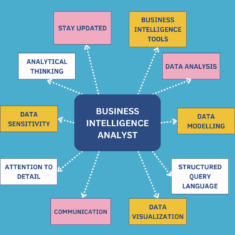
What are the required skills for Business Intelligence?
Firstly, let's have a look at what is Business Intelligence (BI). Simply put, it is the transformation of raw data into meaningful insights, enabling timely and informed decision-making in a business.
Business Intelligence is utilized in any sector that collects and needs to understand data, including banking, sales, aviation, telecommunications, and tourism.
For those who enjoy working with data and derive pleasure from extracting valuable meaning from raw data, BI is an ideal field.
Below are the various skills that I believe are required to become a BI specialist.
Business Intellegence Tools
Knowledge of popular Business Intelligence (BI) tools, such as Power BI or Tableau, is crucial. These tools are used to process collected data into dashboards or reports. Power BI is relatively easy to master due to its user-friendly interface, and there is a wealth of materials and courses available across various platforms.
Data Analysis
Since you handle large volumes of data daily, it is important to have the ability to identify, analyze, understand, and interpret data from various sources.
Data Modelling
Having a good understanding of how to import data from various databases, establish logical relationships between them, and perform data cleansing and preparation for visualization is crucial.
Structured Query Language
Good proficiency in Structured Query Language (SQL) is a core skill for a BI specialist. It is crucial for data retrieval, interpretation and analysis.
Data Visualisation
Probably the most important part, at the end of all the data processing, is presenting the data visually for better understanding of the business. Bring in your creativity here. Success lies in creating simple, yet appealing visuals.
Communication
Effective communication with different stakeholders is key. This involves understanding their requirements, providing appropriate training on the dashboards, and collaborating with various teams, including cross-functional ones, to ensure end-to-end project delivery.
Attention to Detail
For individuals working with data—often an organization's most sensitive information—keen attention to detail is critical. Incorrect data can lead to faulty conclusions, rendering even well-presented visuals meaningless.
Data Sensitivity
As a BI analyst, you will often handle an organization's or team's most sensitive information. It is essential to prioritize data privacy and security, ensuring that necessary security measures are applied when working with and sharing dashboards across different teams.
Analytical Thinking
BI is not always about what had happened in the business, but it is also about the future. A good BI analyst should be able to predict patterns and trends. It is like being a detective! In BI, analytical thinking helps to make sense of complex information, identify opportunities or issues, and make informed decisions.
Stay Updated
Keeping updated with new designs and trends are important. This is important in every job, but it is particularly significant in this field. For example, the widely used BI tool, Power BI, receives monthly updates. Staying updated with the latest updates and technology is essential.
Business Intelligence is an interesting and a demanding field. Being able to bring valuable meanings to a business gives a great sense of happiness. Get started with online platforms like YouTube or Coursera to master these skills and explore this field in your career journey.
By the same author:
Unveiling the power of Business Intelligence
Images: depositphotos, canva




